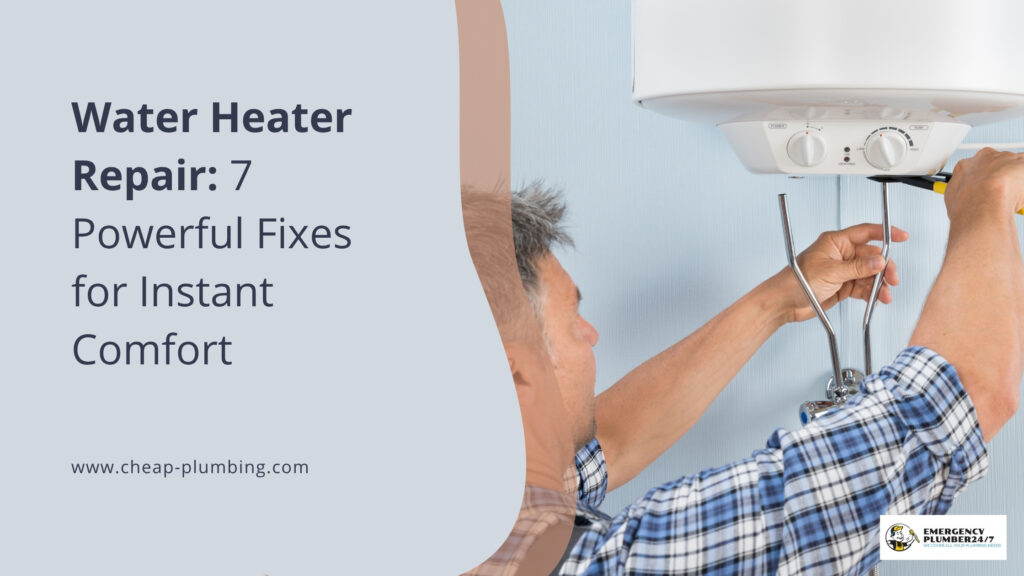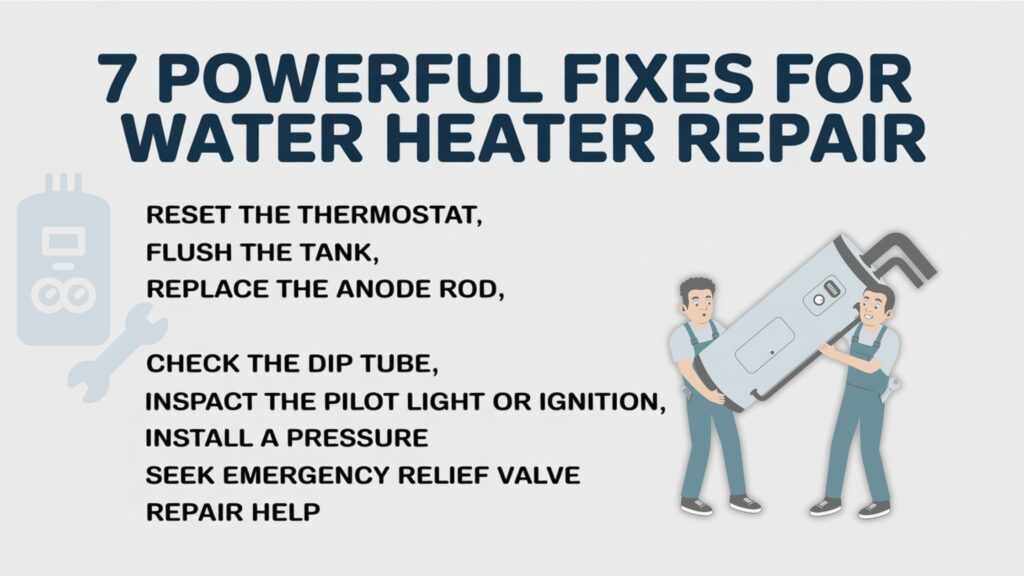There’s nothing more frustrating than stepping into a cold shower when you expected soothing warmth. Whether it’s a sudden breakdown or ongoing issue, water heater repair is something every homeowner eventually faces. From minor fixes to urgent repairs, knowing what to do can save time, stress, and costly mistakes. In this guide, we’ll walk you through powerful and practical fixes for water heater problems—plus share real insights, quick comparisons, and even how issues like emergency boiler repair and unblock outside drain relate to your heating system. Let’s restore your comfort fast.

Understanding Water Heater Repair
Water heater repair involves identifying, diagnosing, and fixing malfunctions in your water heating system. Common problems include no hot water, strange noises, leaks, or temperature fluctuations. While some fixes are DIY-friendly, others need professional attention—especially when linked to safety components or complex gas systems.
Signs You Need Immediate Water Heater Repair
🔧 Common Indicators:
- No hot water or inconsistent temperature
- Water heater making popping or rumbling sounds
- Leaking tank or moisture near the base
- Discolored or smelly water
- High energy bills
When these signs appear, it’s time to act fast—especially if your unit is linked to essential home systems like your emergency boiler repair mechanism.
Quick Water Heater Problem Diagnosis
| Problem | Likely Cause | DIY Friendly? |
|---|---|---|
| No hot water | Faulty thermostat or pilot | ✅ Yes |
| Rusty water | Corroded anode rod | ✅ Yes |
| Popping sounds | Sediment buildup | ✅ Yes |
| Leaking tank | Cracked inner tank | ❌ No |
| Smelly water | Bacteria buildup | ✅ Yes |
7 Powerful Fixes for Water Heater Repair
1. Reset the Thermostat
Often overlooked, simply resetting your water heater’s thermostat can resolve minor glitches. If your unit is electric, shut off the breaker before resetting.
2. Flush the Tank
Sediment buildup causes overheating and popping sounds. Drain and flush the tank once a year to prevent damage and improve efficiency.
3. Replace the Anode Rod
If your hot water smells or appears rusty, your anode rod may be worn out. Replacing it is affordable and extends the life of your unit.
4. Check the Dip Tube
A broken dip tube sends cold water to the top of the tank, causing lukewarm output. Replacing it restores hot water performance.
5. Inspect the Pilot Light or Ignition
For gas models, a weak or unlit pilot light means no heat. Clean the flame sensor or relight according to your manufacturer’s guide.
6. Install a Pressure Relief Valve
If water leaks around your heater, the pressure may be too high. Install or replace the T&P valve to release excess pressure safely.
7. Seek Emergency Boiler Repair Help
If your water heater is part of a central system or boiler, issues can spread. In these cases, a fast emergency boiler repair is essential to prevent a full system shutdown.

Essential Tools for Basic Water Heater Repair
- Adjustable wrench
- Pipe thread seal tape
- Bucket and hose for draining
- Replacement anode rod
- Multimeter (for electric units)
- Screwdriver set
Expert Tip: Unblock Outside Drain to Prevent Water Heater Flooding
Many water heaters are located in utility spaces with nearby drains. A clogged outside drain can lead to water backup and heater damage. Schedule regular inspections to unblock outside drain lines, especially during the rainy season or after storms.
Testimonials
James D. – Croydon, UK
“I called for water heater repair on a Sunday evening and was surprised how quickly the issue was fixed. The technician also advised on how to unblock outside drain connections, which probably saved us from more damage.”
Sofia R. – South London
“I had no hot water for two days. Their water heater repair was professional and fast, and they also flagged an emergency boiler repair we didn’t know we needed. Top service!”
Mark L. – Surrey
“I tried flushing the heater myself using their guide, and it worked! Saved me time and money. Thanks for the clear instructions!”
When to Call a Professional
- You smell gas around your water heater
- Water is leaking from the tank base
- Resetting or flushing doesn’t restore hot water
- Electrical components seem faulty or spark
- Heater is over 10 years old and showing signs of rust
FAQ: People Also Ask
What is the most common problem with water heaters?
Sediment buildup and faulty thermostats are the most common problems, both of which reduce heating efficiency and lead to inconsistent water temperatures.
Can I repair a water heater myself?
Yes, basic tasks like flushing the tank, replacing the thermostat, or changing the anode rod can be DIY, but more complex issues require a licensed plumber.
How much does water heater repair cost?
Costs vary between £80–£300 depending on the part and service needed. Emergency services, especially involving emergency boiler repair, may cost more.
Is it better to repair or replace a water heater?
If your unit is under 8–10 years old and the damage is minor, repair is the cost-effective option. For older units with major issues, replacement may save more in the long run.
How do I prevent water heater problems?
Schedule annual maintenance, flush the tank regularly, check the pressure valve, and unblock outside drain systems to reduce risks.
Related Insights (People Also Search For)
- Hot water not working
- Gas water heater pilot won’t stay lit
- Electric water heater not heating
- Water heater leaking from top
- Boiler not heating water
- Unblock outside drain
Conclusion
Don’t wait for small issues to become big problems. If your water heater is acting up or you need urgent help, trust the experts at Cheap Plumbing. Our certified plumbers are available 24/7 to handle everything from water heater repair to emergency boiler repair—even if you need to unblock outside drain lines fast.
👉 Get Emergency Plumbing Services Now – Reliable. Affordable. Always Ready.
